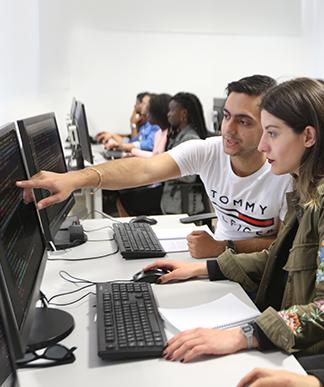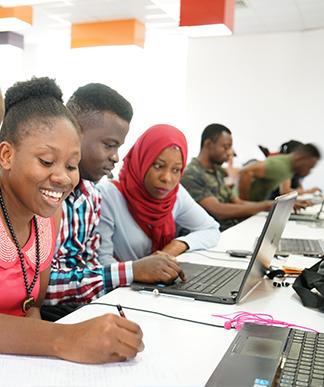


About the Program
Computer engineering exists at the intersection of technology and innovation. The Computer Engineering Program is designed to give students a strong background in the fundamentals of mathematics, physics, computer engineering and science. Graduates of this program should be able to use these fundamentals to analyze and evaluate computer systems, both hardware and software. They should also be able to design and implement computer systems, which are state-of-the-art solutions to a variety of computing problems. In addition to these program-specific objectives, all students in the Department of Computer Engineering are exposed to societal issues, professionalism, ethics, and have the opportunity to develop leadership and teamwork skills.
Education Opportunities
The curriculum of the Department of Computer Engineering is designed to fulfill the daily needs of organizations through subject matter courses covering mathematics, electrical and electronic engineering courses, and elective courses. Throughout their studies, students take courses on artificial intelligence, databases, operating systems, computer networks, various programming languages and programming techniques, microprocessors, signal processing, and project management. Almost all courses have practical components that consolidate theoretical knowledge. Through both theoretical courses and lab sessions, students can prepare themselves for professional life easily under the supervision of well-respected and expert academics.

Accreditations
Computer Engineering Program has been accredited by the Engineering Education Programs Evaluation and Accreditation Association (MÜDEK) in 2014 and has international recognition. In 2019, the program, which received its accreditation, was also awarded the European Accredited Engineer Label EUR-ACE.
The Computer Engineering undergraduate program is accredited by the Association for Evaluation and Accreditation of Engineering Programs (MÜDEK), and also has Oracle Academy and Microsoft Imagine Academy memberships.
Career Areas
Our undergraduate program graduates receive the “Computer Engineer” degree and they can work all over the world with the high-quality knowledge and experience gained during their education. They can have a career in a wide range of areas, such as information technology management, software development, software design, database management and design, system security, information technology counseling, web-based application development, system integration, industrial software, software project management, computer networks, network management, and system management. In addition, they can continue postgraduate studies in a field relevant to computer technologies in order to be specialized in a certain area and they can have an academic career as well.
Contact
Faculty of Engineering
Science and Technology Center, ST226
Tel: +90 392 671 1111 Extension: 2401
Faculty E-mail: secretary-fe@ciu.edu.tr
Head of Department: Asst. Prof. Dr. Devrim SERAL
Head of Department E-mail: dseral@ciu.edu.tr
Compulsory Courses
First Semester
INTRODUCTION TO COMPUTER ENGINEERING
Course code
CMPE100Credit
0Theoretical
1Practical
0Ects
3INTRODUCTION TO PROGRAMMING
Course code
CMPE111Credit
4Theoretical
3Practical
2Ects
6READING AND WRITING SKILLS-I
Course code
ENGL141Credit
3Theoretical
2Practical
2Ects
4CALCULUS-I
Course code
MATH101Credit
4Theoretical
3Practical
2Ects
6LINEAR ALGEBRA
Course code
MATH121Credit
2Theoretical
2Practical
0Ects
4GENERAL PHYSICS-I
Course code
PHYS101Credit
4Theoretical
3Practical
2Ects
6TURKISH LANGUAGE
Course code
TREG100Credit
0Theoretical
2Practical
0Ects
2TURKISH
Course code
TURK100Credit
0Theoretical
2Practical
0Ects
2Second Semester
ALGORITHMS AND PROGRAMMING
Course code
CMPE124Credit
4Theoretical
3Practical
2Ects
6READING AND WRITING SKILLS-II
Course code
ENGL142Credit
3Theoretical
2Practical
2Ects
4HISTORY OF CIVILIZATION
Course code
HIST100Credit
0Theoretical
2Practical
0Ects
2CALCULUS-II
Course code
MATH102Credit
4Theoretical
3Practical
2Ects
6DISCRETE MATHEMATICS
Course code
MATH122Credit
3Theoretical
3Practical
1Ects
5GENERAL PHYSICS-II
Course code
PHYS102Credit
4Theoretical
3Practical
2Ects
6MODERN TURKISH HISTORY
Course code
TARH100Credit
0Theoretical
2Practical
0Ects
2Third Semester
DIGITAL LOGIC DESIGN
Course code
CMPE221Credit
4Theoretical
3Practical
2Ects
7INTERNET PROGRAMMING
Course code
CMPE233Credit
3Theoretical
3Practical
0Ects
5DIFFERENTIAL EQUATIONS
Course code
MATH203Credit
3Theoretical
3Practical
1Ects
5INTRODUCTION TO PROBABILITY AND STATISTICS
Course code
MATH205Credit
4Theoretical
4Practical
1Ects
6UNIVERSITY ELECTIVE
Course code
UNIEXX1Credit
3Theoretical
3Practical
0Ects
5Fourth Semester
COMPUTER ARCHITECTURE AND ORGANIZATION
Course code
CMPE226Credit
4Theoretical
3Practical
2Ects
6DATA STRUCTURES AND DATA ORGANIZATION
Course code
CMPE242Credit
4Theoretical
3Practical
2Ects
6FREE ELECTIVE
Course code
FREEXX1Credit
4Theoretical
3Practical
2Ects
7FREE ELECTIVE
Course code
FREEXX2Credit
3Theoretical
3Practical
0Ects
7MATHEMATICAL METHODS FOR ENGINEERS
Course code
MATH202Credit
3Theoretical
3Practical
1Ects
6Fifth Semester
OBJECT ORIENTED PROGRAMMING
Course code
CMPE313Credit
4Theoretical
3Practical
2Ects
6DATABASE MANAGEMENT SYSTEMS AND PROGRAMMING-I
Course code
CMPE343Credit
4Theoretical
3Practical
2Ects
5OPERATING SYSTEMS
Course code
CMPE351Credit
4Theoretical
3Practical
2Ects
6SIGNALS & SYSTEMS
Course code
EELE321Credit
4Theoretical
4Practical
1Ects
6FREE ELECTIVE
Course code
FREEXX3Credit
3Theoretical
3Practical
0Ects
7Sixth Semester
SOFTWARE ENGINEERING
Course code
CMPE314Credit
4Theoretical
3Practical
2Ects
6MICROPROCESSORS
Course code
CMPE324Credit
4Theoretical
3Practical
2Ects
6FUNDAMENTALS OF COMPUTER NETWORKS
Course code
CMPE332Credit
4Theoretical
3Practical
2Ects
6AREA ELECTIVE
Course code
CMPEXX1Credit
3Theoretical
3Practical
0Ects
6AREA ELECTIVE
Course code
CMPEXX2Credit
3Theoretical
3Practical
0Ects
6Seventh Semester
SUMMER TRAINING
Course code
CMPE300Credit
0Theoretical
0Practical
0Ects
5ARTIFICIAL INTELLIGENCE
Course code
CMPE415Credit
3Theoretical
3Practical
1Ects
5COMPUTER NETWORK DESIGN AND APPLICATIONS
Course code
CMPE431Credit
3Theoretical
2Practical
2Ects
5AREA ELECTIVE
Course code
CMPEXX3Credit
3Theoretical
3Practical
0Ects
6PROJECT MANAGEMENT
Course code
ENGI401Credit
3Theoretical
3Practical
0Ects
5UNIVERSITY ELECTIVE
Course code
UNIEXX2Credit
3Theoretical
3Practical
0Ects
5Eighth Semester
SYSTEMS PROGRAMMING
Course code
CMPE412Credit
4Theoretical
3Practical
2Ects
6AREA ELECTIVE
Course code
CMPEXX4Credit
3Theoretical
3Practical
0Ects
6CAPSTONE PROJECT
Course code
ENGI402Credit
4Theoretical
2Practical
4Ects
8ENGINEERING ECONOMY
Course code
INDE232Credit
3Theoretical
3Practical
0Ects
4UNIVERSITY ELECTIVE
Course code
UNIEXX3Credit
3Theoretical
3Practical
0Ects
5Elective Courses
INTERNET PROGRAMMING-II
Course code
CMPE483Credit
3Theoretical
3Practical
0Ects
MOBILE APPLICATION DEVELOPMENT
Course code
CMPE425Credit
3Theoretical
3Practical
0Ects
INTRODUCTION TO CRYPTOGRAPHY AND NETWORK SECURITY
Course code
CMPE336Credit
3Theoretical
3Practical
0Ects
ROBOTICS
Course code
EELE411Credit
3Theoretical
3Practical
1Ects
5MANAGEMENT INFORMATION SYSTEMS
Course code
ISYE263Credit
3Theoretical
3Practical
0Ects
4CLOUD COMPUTING
Course code
CMPE481Credit
3Theoretical
3Practical
0Ects
PROGRAMMING IN MATLAB FOR ENGINEERING
Course code
ENGI316Credit
3Theoretical
3Practical
0Ects
COMPUTER SIMULATION
Course code
CMPE485Credit
3Theoretical
3Practical
0Ects
ETHICS
Course code
INDE335Credit
3Theoretical
3Practical
0Ects
4INFORMATION SECURITY AND ASSURANCE
Course code
ISYE371Credit
3Theoretical
3Practical
0Ects
6EMBEDDED SYSTEMS
Course code
CMPE455Credit
3Theoretical
3Practical
0Ects
5MODERN PROGRAMMING PLATFORMS
Course code
CMPE442Credit
3Theoretical
3Practical
0Ects
SIGNAL AND IMAGE PROCESSING
Course code
CMPE326Credit
3Theoretical
3Practical
1Ects
6INTRODUCTION TO BIOMETRIC SYSTEMS
Course code
CMPE466Credit
3Theoretical
3Practical
0Ects
DESKTOP APPLICATION DEVELOPMENT
Course code
CMPE424Credit
3Theoretical
3Practical
0Ects
INFORMATION SYSTEMS ANALYSIS AND DESIGN
Course code
ISYE272Credit
3Theoretical
3Practical
1Ects
5BUSINESS INTELLIGENCE
Course code
ISYE472Credit
3Theoretical
3Practical
0Ects
6COMPUTER AIDED DATA ANALYSIS
Course code
INDE491Credit
3Theoretical
3Practical
0Ects
IOT FOR ENGINEERING
Course code
ENGI416Credit
3Theoretical
2Practical
2Ects
5TOTAL QUALITY MANAGEMENT
Course code
INDE428Credit
3Theoretical
3Practical
0Ects
HAZARDOUS AND SPECIAL WASTE MANAGEMENT
Course code
ENVE431Credit
3Theoretical
3Practical
0Ects
5MIDDLE EAST ENERGY OUTLOOK
Course code
PNGE415Credit
3Theoretical
3Practical
0Ects
5SUPPLY CHAIN AND LOGISTICS MANAGEMENT
Course code
INDE461Credit
3Theoretical
3Practical
0Ects
0DIGITAL CONTROL SYSTEMS
Course code
EELE403Credit
3Theoretical
3Practical
1Ects
BIOINFORMATICS
Course code
BIOE305Credit
3Theoretical
3Practical
0Ects
5SOIL AND GRD.WATER POLLUTION
Course code
ENVE427Credit
3Theoretical
3Practical
0Ects
NATURAL LANGUAGE PROCESSING
Course code
AIEN422Credit
3Theoretical
3Practical
1Ects
5ENVIRONMENTAL MANAGEMENT
Course code
ENVE407Credit
3Theoretical
3Practical
0Ects
5SPECIAL TOPICS IN ENVIRONMENTAL ENGINEERING I
Course code
ENVE494Credit
3Theoretical
3Practical
0Ects
5DIGITAL SIGNAL PROCESSING
Course code
EELE420Credit
3Theoretical
3Practical
0Ects
SIGNALS AND SYSTEMS
Course code
CMPE321Credit
4Theoretical
4Practical
1Ects
7ENVIRONMENTAL IMPACT ASSESSMENT
Course code
ENVE402Credit
3Theoretical
3Practical
0Ects
BIOPROCESS ENGINEERING
Course code
BIOE308Credit
4Theoretical
3Practical
2Ects
7COMPUTER AIDED DESIGN
Course code
MCLE475Credit
3Theoretical
2Practical
3Ects
6NETWORK ANALYSIS
Course code
INDE301Credit
3Theoretical
3Practical
0Ects
CLOUD COMPUTING
Course code
ISYE481Credit
3Theoretical
3Practical
0Ects
WORLD ENERGY POLITICS
Course code
PNGE451Credit
3Theoretical
3Practical
0Ects
0Curriculum before 2024-25
Click here to see curriculum
TR Applicants
TR Students who are successful in the exams conducted by the Higher Education Council Student Selection and Placement Center (ÖSYM) and are entitled to enroll in our university in line with their preferences can complete the registration process with the necessary documents for registration from our Registration and Liaison Offices throughout Turkey or from the Marketing Directorate on campus.
Click for detailed admission requirements information.
TRNC Applicants
TRNC citizens and TR citizen candidate students who have completed their entire high school education in TRNC. They are placed in undergraduate programs in line with their success in the CIU Student Placement and Scholarship Ranking Exam and the programs they prefer.
Students who are successful in the exam can register from the TRNC Marketing Office.
Applicants can directly apply online to our undergraduate programs using the application portal. Please fill in your details correctly and upload all the required documents listed on the last page of the application form.
Required documents;
- Completed application form,
- Higher/Secondary Certificate or equivalents (e.g. O/A’Level, WAEC/NECO),
- Evidence of English Language competence: TOEFL (65 IBT) or IELTS (5.5). Students without these documents will take the CIU English proficiency exam on campus following arrival,
- Scanned copy of international passport/birth certificate,
- Fully completed and signed CIU Rules and Regulations document (which can be downloaded during the online application).
Cyprus International University provides academic scholarships for its students as an incentive for success, with most students benefiting from 50%, 75% or 100% scholarships or discounted tuition fees. Click for more information.
Tuition Fees are determined at the beginning of each academic year. Candidate students who are entitled to enroll in CIU can learn their fees in line with the Tuition Fee Calculation system.
Program Outcomes
The learning outcomes for the Department of Computer Engineering, CIU undergraduate program are as follows:
PO1: Have adequate knowledge in mathematics, science, and engineering; be able to apply theoretical and practical knowledge to solve complex engineering problems.
PO2: Be able to identify, define, formulate and solve complex engineering problems; conduct suitable analysis and modeling methods.
PO3: Be able to design a complex system, process, device or product to meet specific requirements under the realistic constraints and conditions; and apply modern design methods to achieve this.
PO4: Be able to develop, select and use modern techniques and tools necessary for the analysis and solution of complex problems encountered in engineering practices; and use information technologies effectively.
PO5: Be able to design and conduct experiments, collect data, analyze and interpret results to investigate complex engineering problems or subject-specific research topics.
PO6: Be able to work effectively in disciplinary and multidisciplinary teams; develop self-study skills.
PO7: Be able to communicate effectively in oral and written Turkish; have the knowledge of at least one foreign language; be able to write effective reports and understand written reports, prepare design and production reports; prepare and give effective presentations; give clear and understandable instruction and possess receptive skills.
PO8: Be aware of the necessity of lifelong learning; be able to access information, follow the most recent developments in science and technology and continuously update his/her knowledge and skills.
PO9: Be able to act in accordance with the ethical principles, have awareness of professional and ethical responsibility; have information about certain standards used in engineering practices.
PO10: Have information about business practices such as project management, risk management, and change management; be aware of entrepreneurship and innovation; have information on sustainable development.
PO11: Learn the effects of engineering practices on health, environment, and safety in universal and social dimensions and have information on the most up-to-date engineering practices; have awareness of the legal consequences of engineering solutions.
Educational Goals
Graduates of the Department of Computer Engineering, CIU;
will be able to solve technical and professional problems in their work lives; be able to work in teams; be able to communicate well; undertake the role of the leader and perform engineering practices; conduct research-development activities, fulfil operation and management duties at national and international companies; conduct scientific research in computer engineering or related disciplines inland or abroad; be able to pursue postgraduate degrees; and will be able to establish and develop national or international companies in computer science and engineering or other related fields with an innovative and entrepreneurial vision.